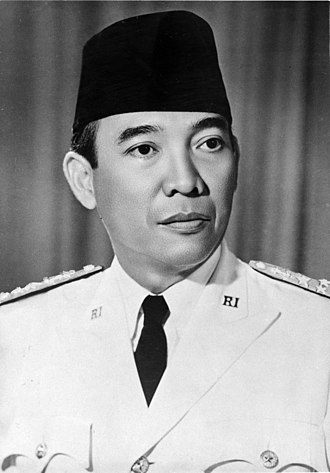WikipediaExtracts:Sukarno
Extracted from Wikipedia --
Sukarno (born Koesno Sosrodihardjo; 6 June 1901 – 21 June 1970) was an Indonesian statesman, activist, and revolutionary who served as the first president of Indonesia from 1945 to 1967.
Sukarno was the leader of the Indonesian struggle for independence from the Dutch colonialists. He was a prominent leader of Indonesia's nationalist movement during the colonial period and spent over a decade under Dutch detention until released by the invading Japanese forces in World War II. Sukarno and his fellow nationalists collaborated to garner support for the Japanese war effort from the population, in exchange for Japanese aid in spreading nationalist ideas. Upon Japanese surrender, Sukarno and Mohammad Hatta declared Indonesian independence on 17 August 1945, and Sukarno was appointed president. He led the Indonesian resistance to Dutch re-colonisation efforts via diplomatic and military means until the Dutch recognition of Indonesian independence in 1949. As a result, he was given the title "Father of Proclamation" (Indonesian: Bapak Proklamator).
After a tumultuous period of parliamentary democracy, Sukarno introduced an authoritarian system known as "Guided Democracy" in 1959 to restore stability and suppress regional rebellions. By the early 1960s, Sukarno pursued an aggressive foreign policy and positioned Indonesia as a leading voice in the anti-imperialist Non-Aligned Movement (NAM). These policies increased tensions with Western powers and brought Indonesia closer to the Soviet Union, despite being a non-communist state. The culmination of this policy was CONEFO, Sukarno's plan for a new United Nations based in Jakarta.
Following the events of the 30 September Movement, a coup attempt allegedly orchestrated by senior leaders in the Communist Party of Indonesia (PKI), General Suharto assumed control of the government in a military takeover. This was accompanied by a large-scale anti-communist purge backed by Western intelligence agencies including from the United States and the United Kingdom. Between 500,000 and over one million people were killed in mass killings targeting members and suspected sympathisers of the PKI.
Suharto officially became president in 1967, while Sukarno was placed under house arrest until his death in 1970. He was buried in Blitar, East Java, next to his mother. During the first few years of Suharto's New Order regime, Sukarno's role in the country's independence and his earlier achievements were minimized, and his name was largely removed from public discourse. However, as opposition against Suharto increased with his eventual fall in 1998, public interest in Sukarno was revived in tandem to democratic reforms. Today, his legacy as the founding father of Indonesia and a symbol of national unity and independence continues to be widely respected by many Indonesians, often more so than that of Suharto.
